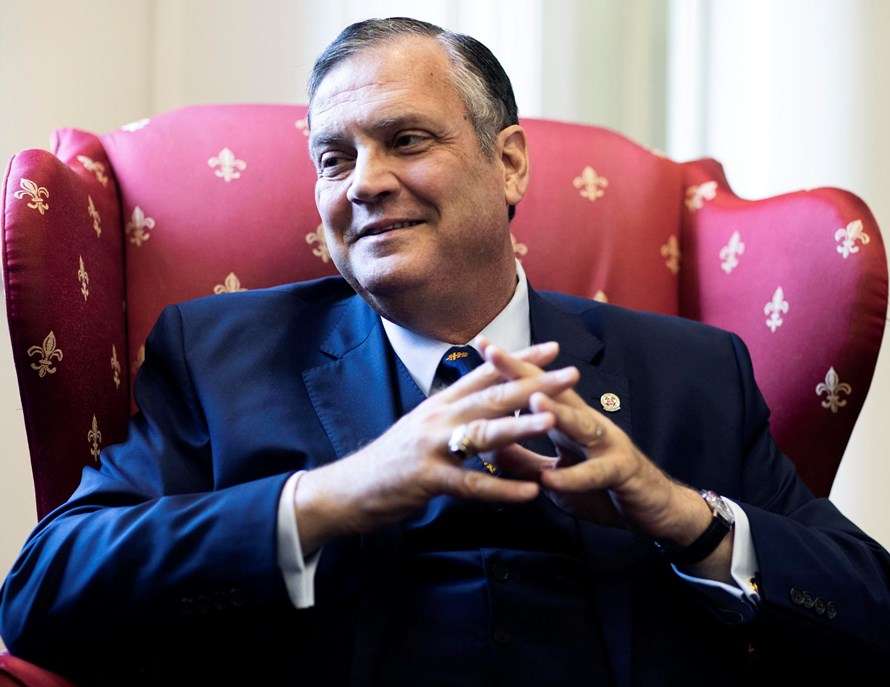Albert Mohler let loose on Donald Trump in an interview with Issac Chotnier of the New Yorker, excoriating the President and those defending what Mohler feels are his worst excesses. We’ve republished a few of the relevant portions here, but you should really go read the rest, which they discuss the President more at length. We’ve linked to the rest of the article below
You said, in 2016, “Perhaps the best we can hope for in this sad election cycle with these two unsupportable candidates is that we do not allow a national disgrace to become the Great Evangelical Embarrassment.” Trump is now supported by a huge majority of American evangelicals. Has it been an embarrassment?
Yes. President Trump is a huge embarrassment. And it’s an embarrassment to evangelical Christianity that there appear to be so many who will celebrate precisely the aspects that I see Biblically as most lamentable and embarrassing. So I have to make a distinction between voting for a candidate and rationalizing for a candidate, much less being enthusiastic about what I would see as the character faults of a candidate. I intend to vote for Donald Trump in 2020, but my shift is from reluctantly not voting for him in 2016 to what you might call reluctantly voting for him in 2020, and hoping for his reëlection, because the alternative is increasingly unthinkable. But I will not become an apologist for the misbehavior of the President and for what I see as glaring deficiencies in his private and public character.
There will be a good many evangelicals angry with me for stating what I just said to you.
You are someone who does not like President Trump, but how do you understand his appeal? What did you misjudge, or what did we all misjudge?
Well, one of the difficulties for a classical conservative is whether or not conservatism and populism are implacable enemies. For most of the twentieth century, the assumption was that conservatism and populism, or popular support maybe defined as populism, are un-unitable, incommensurate. But the election of Ronald Reagan as President, in 1980, was a counter to that argument. Reagan became the refutation of a conservative assumption that to have that level of popular support meant that you could not truly be a conservative. Evangelicals really became politically activated in the Reagan campaign in 1980. That’s a crucial moment. So I think many observers, perhaps like at The New Yorker, fail to understand that a certain instinct became an intuition in American evangelicalism, which is that the candidate that would be most attractive would be one that would combine a conservative political philosophy and genuine populist support.
Now, Trump is very different than Ronald Reagan. Ronald Reagan was elegant and genial, the total package. But there was enormous personal pride on the part of conservatives in Ronald Reagan’s statesmanship on the world scene. The period between Reagan and Trump was one of evangelical frustration, you could even say conservative frustration. That’s not to say that there was no appreciation for either George H. W. Bush or George W. Bush. There was. I was among those that had a great deal of admiration for both, but there was still frustration. I think we now know there was a lot more frustration at the grassroots level than any of the élites.
In a sense, given my leadership in the S.B.C., I did not sense some of that energy and unrest that exploded onto the scene, which was, frankly, far more populist than conservative. It clearly gained the support of millions and millions of those who had more conservative instincts but were driven by a real populist outrage at the political orders as they were. But I don’t see any evidence that would say evangelicals as a bloc produced Donald Trump as the nominee of the Republican Party in 2016. The evangelical vote was split all over the place. But, when it became a binary choice, and it became Donald Trump versus Hillary Clinton, that entire equation changed.
But Trump could’ve been impeached and removed, and Mike Pence could’ve become President and given conservatives the same judicial appointments. There could’ve been a Republican-primary challenge of real seriousness from a true conservative this year.
Well, you switched the categories on me a little bit. Because we started talking about evangelicals, and now you’re talking about conservatives. I don’t equate the two.
I just meant there could’ve been an evangelical-led, or conservative-led, movement to have a Republican Party that was as committed to its platform on issues of abortion and on issues of judges and so on, but without Trump.
That’s an interesting—but to me not very interesting for long—hypothetical. In 2016, you’re actually making my point. In 2016, there was enormous, enormous evangelical support for other candidates. But it was spread among those candidates. You had many evangelicals who supported Marco Rubio. You had perhaps an even larger number, certainly in the end of the primary process, who supported Ted Cruz. But when it became binary, evangelicals followed their instinct and their vehement opposition to the platform of the Democratic Party and the candidacy of Hillary Clinton and helped put Donald Trump in the White House. And I believe they will do so again in 2020.
To continue reading, click here











